Speaking in an interview this weekend with daily Le Monde, French far-right Front National leader Marine Le Pen has confirmed revelations by Mediapart that she has obtained a loan of 9 million euros for her party from the Moscow-based First Czech Russian Bank.
The party has now received 2 million euros of the loan which was agreed in September, and which has a fixed interest rate of 6% and, according to a close advisor of Le Pen’s, a drawing right “according to financing requirements”.
French far-right Member of the European Parliament (MEP) Jean-Luc Schaffhauser, a former consultant for French aviation firm Dassault, served as a key intermediary in Russia to broker the deal with the Russian bank, reached at a moment of high tension between the European Union (EU) and Russia over the crisis in Ukraine.
Five Russian state-owned banks, Sberbank, VTB Bank, Gazprombank, Vnesheconombank and Rosselkhozbank (Russian Agriculture Bank) are the subject of sanctions that bar them from EU capital markets. The EU sanctions also bans 119 Russian nationals, including a number of bankers and oligarchs, from entering the territories of member-states. One of these is Alexander Mikhailovich Babakov, a member of the Russian parliament, the Duma, and who served as one of the Front National’s contacts in its negotiations for the bank loan.
“Our party has asked all the French banks for loans, but none agreed,” Marine Le Pen told French news magazine L’Obs on October 23rd. “So we asked several banks abroad, in the United States, in Spain and, yes, in Russia.” Le Pen said her party was, when the interview took place, still waiting for replies from the foreign banks. She said she did not know the names of the banks that had been contacted, adding: “It’s the treasurer who looks after that”. She underlined that “the idea is, of course, to repay these loans”.
Contacted in late October, Front National treasurer Wallerand de Saint-Just told Mediapart that the party had contacted many “French and European banks” in search of a loan. “In France it’s 'nyet',” he said. “They won’t lend a centime since the rejection of Nicolas Sarkozy’s accounts. We widened the circle. These kind of negotiations, the more discreet the better. We made contact with the biggest among banks. We sent letters, that’s all. Most of the time, we don’t get an answer.” At the time he was contacted, the Front National treasurer did not confirm the loan obtained from the First Czech Russian Bank (FCRB) one month earlier, in September.
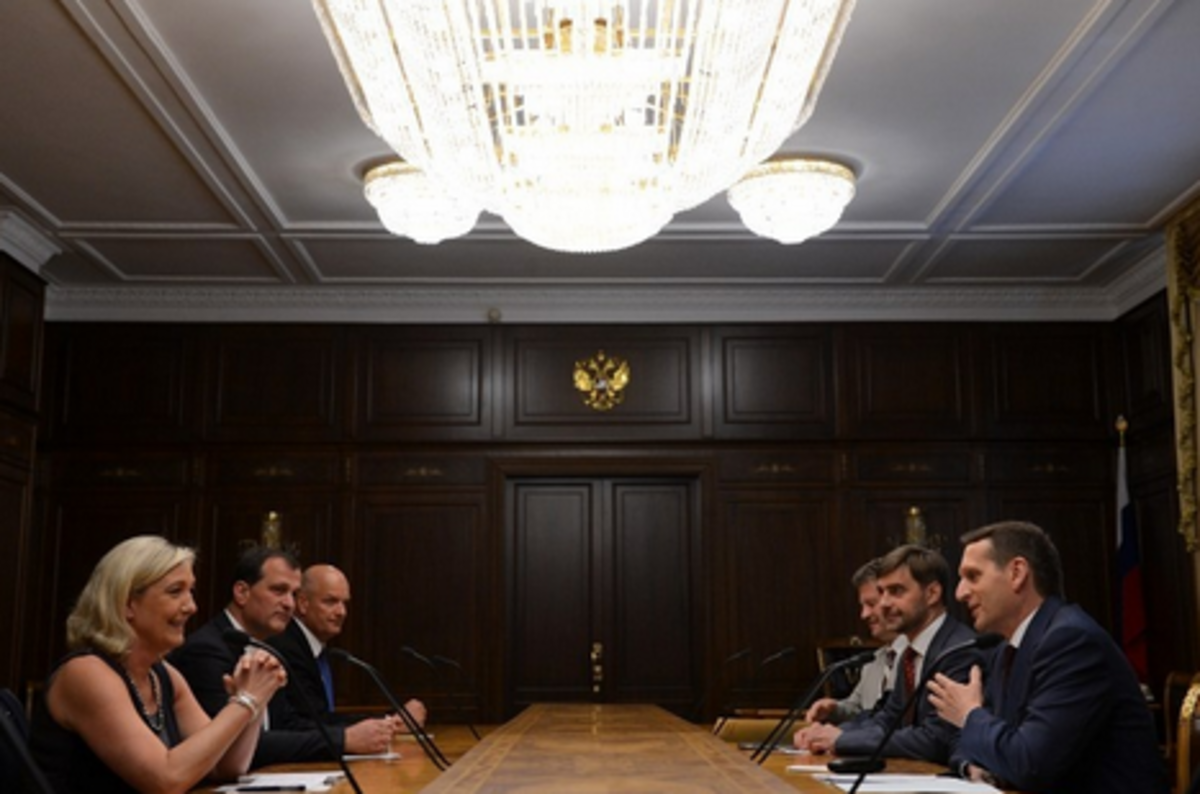
Mediapart contacted Le Pen’s chief-of-staff and communications director Philippe Martel to ask her for an interview on the subject of the loan, but she did not respond. “As usual, I don’t answer Mediapart,” said Martel. “Marine Le Pen won’t answer you.”
Mediapart also recontacted Front National treasurer Wallerand de Saint-Just, who also refused to talk about the loan. “Thank you, but I don’t intend to answer you,” he said.
However, French far-right MEP Jean-Luc Schaffhauser confirmed his key role in reaching the deal with the Russian bank. “We did our job, there’s nothing that’s reprehensible,” he said, adding that he regretted that his “friendships and networks” were exposed in the media.
“Banks are very shy to lend money to political parties, whichever they may be,” commented a member of the Front National’s executive committee whose name is withheld. “It’s not a boycott of the Front National, it’s a generalized fear.”
“As of the moment it’s not a gift or a subsidy, which coming from a foreign state would be prohibited, it doesn’t shock me,” he added.
“Why wouldn’t it be good news to have found a bank that lends?” asked Christian Bouchet, secretary of the local arm of the party in the Loire-Atlantique département (county) in west France. “It’s not worse than borrowing from Gaddafi,” he said, in a reference to Mediapart’s revelations of the Libyan dictator’s funding of Nicolas Sarkozy’s 2007 presidential election campaign. “Why not a Russian bank? What interests the grass roots militants and the middle managers is that Paris pays us our share each year. Money has no smell, it’s above all that.
The securing of the loan is the result of a policy of establishing close ties with Moscow, which Marine Le Pen, who has spoken of her admiration of Russian President Vladimir Putin, began as soon as she took over the leadership from her father, Jean-Marie Le Pen, in 2011.The party embarked on an intense lobbying of the Putin administration while, along with visits to Russia by party officials including MP Marion Maréchal-Le Pen, Marine Le Pen has made several trips to the country.
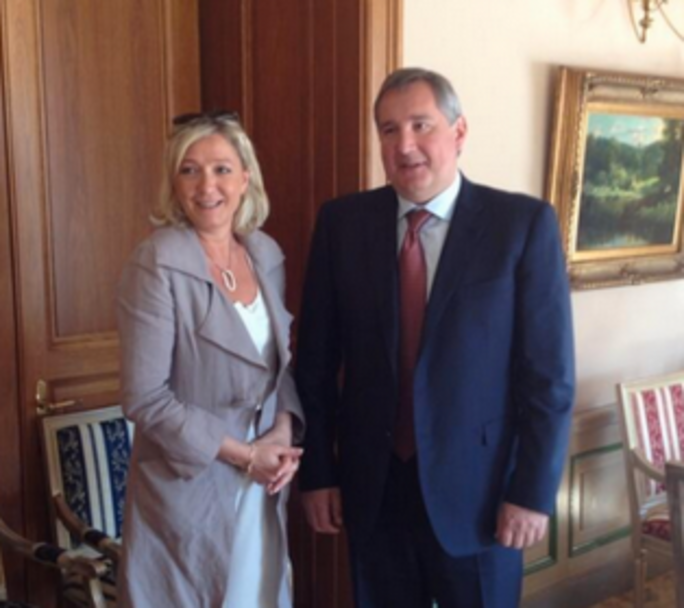
In June 2013 she travelled to Russia with party vice-president Louis Aliot, who is also her personal partner. During the trip, they met with Sergei Naryshkin, speaker of the Russian lower house, the Duma, close to Putin with whom he reportedly served in the KGB - which he has never confirmed. She also met with Deputy Prime Minister Dmitry Rogozin and Alexei Puskov, head of the Duma’s foreign affairs committee. Naryshkin and Rogozin are the object of EU and US asset-freezing and travel bans as part of the sanctions against Russia over the crisis in Ukraine.
After her meeting with Duma speaker Naryshkin, Le Pen held a press conference in which she called for greater ties between France and Russia. “I think we have common strategic interests, I think we also have common values, that we are European countries,” she said. “I have the feeling that the European Union is leading a Cold War against Russia. Russia is presented with a demonized face […] a sort of dictatorship, a country totally closed. That is not, objectively, the reality. I feel more in tune with this model of economic patriotism than with the model of the European Union.”
One of Le Pen’s unofficial advisors, Frédéric Chatillon, who is the head of a communications agency, was present in Moscow at the same time.
For several years, the Russian authorities have courted the French far-right. According to French daily Le Figaro, Naryshkin told her that “you are well-known in Russia and you are a respected political figure.” In April 2014, Le Pen returned to Moscow on a private visit when she met again with Naryshkin.
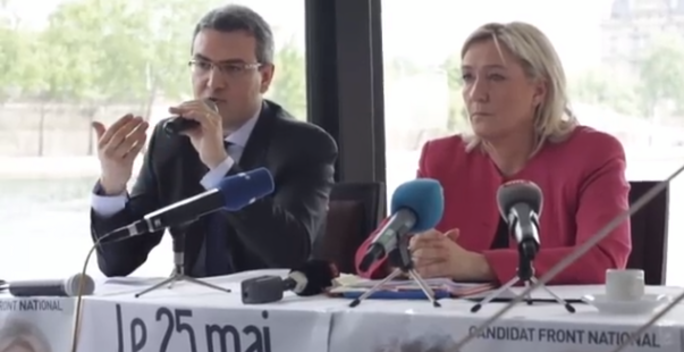
Enlargement : Illustration 3

French weekly L’Obs reported that Le Pen frequently holds private meetings with the Russian ambassador to France, Alexander Orlov. Her openings in Russia are helped by the contacts in the country of Aymeric Chauprade, Front National MEP and Le Pen’s éminence grise for a period of four years, who officially became her international affairs advisor in the autumn of 2013.
In June 2013, Chauprade gave a speech before the Duma in which he called for resistance against “the worldwide extension of the rights of sexual minorities”. He was made an observer of the referendum held in March 2014 by pro-Russian separatists in Crimea.
Chauprade has ties with Russian businessman Konstantin Malofeev, founder of the investment group Marshall Capital Partners, chairman of the Saint Basil the Great Charitable Foundation - the biggest Russian Orthodox charity - and who is close to Vladimir Putin. On May 31st 2014, the two men met in Vienna during a 200th anniversary celebration of the Holy Alliance, the monarchist coalition of Austria, Russia and Prussia, when almost 100 guests partied together behind closed doors. They met again in Moscow in September, during a visit by 14 French parliamentarians demonstrating their support for Russia in the Ukraine crisis.
But it was above all Jean-Luc Schaffhauser who was instrumental in obtaining the Russian bank loan for the Front National. The far-right MEP (who is also a municipal councillor in the French city of Strasbourg), reportedly introduced Marine Le Pen to Alexander Mikhailovich Babakov, a nationalist politician and member of the Duma who was appointed by Putin as his special representative for Russian organizations abroad. The secret meeting with Babakov was reportedly held in February when Le Pen, again according to reports, also met with Putin, setting in train the process of finding a financial institution for the loan to the Front National.
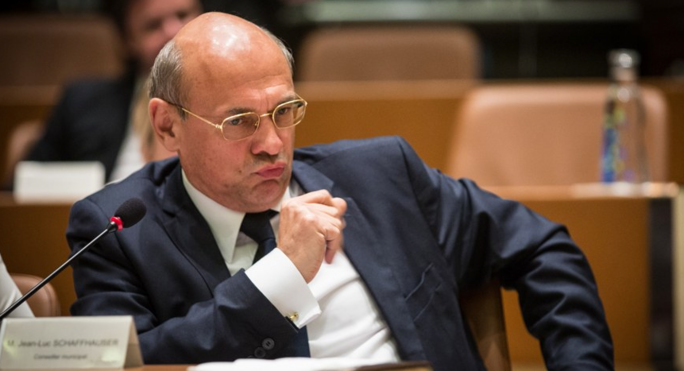
Enlargement : Illustration 4

Babakov, a former leader of the Russian nationalist Rodina party, occupies a number of posts in the Duma, including that of chairman of its commission for the development of the Russian Federation’s defence industry.
In the declaration of his financial and professional interests, and which MEP’s are required to detail by law, Jean-Luc Schaffhauser said he had been a consultant for “the implantation of companies abroad and for the research for funding of companies”. A former centrist politician, and who is not a member of the Front National, Schaffhauser has been an active speaker on issues relating to the crisis in Ukraine in the European Parliament. He travelled to east Ukraine earlier this month to act as an “observer” for a European far-right association of the elections organised by pro-Russian separatists.
A businessman and intermediary before holding political posts, Schaffhauser boasted to a number of Front national officials that it was he who was responsible for obtaining the Russian loan.
The First Czech Russian Bank was created in the Czech Republic in 1996. It was later taken over by Stroytransgaz, the Russian engineering and construction giant active in the gas and oil industries, before coming under the ownership of Roman Yakubovich Popov, a former financial director of Stroytransgaz.
Based in Moscow, Popov has created several subsidiaries of the First Czech Russian Bank, for which he is chairman of the board of management. Among these is the European Russian Bank which is focussed on activities in Europe, notably Italy. Popov appears to be a well-connected figure of Moscow high society, as demonstrated when he co-presided the 50th anniversary celebrations of the first manned flight in space, that of Soviet astronaut Yuri Gagarin, alongside then-President of the Russian Federation, Dimitry Medvedev (now Russian Prime Minister).
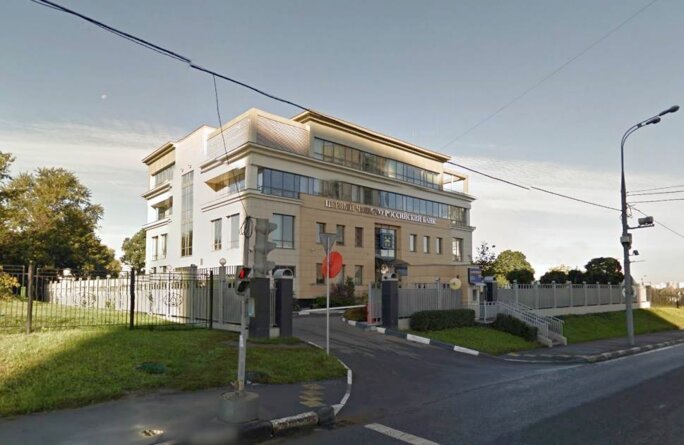
Enlargement : Illustration 5

Receiving a loan from the relatively modest and little-known First Czech Russian Bank raises questions about the nature of the funding and its origins.
Meanwhile, the Kremlin has a clear interest in encouraging a political force in France that is sympathetic to Russia, and in particular given Le Pen’s strengthening position as an alternative to mainstream Right parties.
"Legally, nothing prohibits a political party to take out a loan with a French or foreign bank, on condition of course that the loan does not hide a donation by an individual or money laundering,” commented Jean-Christophe Ménard, a lawyer specialized in French political financing laws and who has served as rapporteur for the French national commission regulating political campaign spending, the CNCCFP.
“The origin of the funds that are loaned to the party is obviously crucial,” Ménard continued. “In the present case [of the Front National loan], the conditions of the loan or the eventual participation by the Russian state in the capital of the bank should be looked at. The problem is that the CNCCFP does not have the competence to allow it to control the legality of this type of financial arrangement, sometimes complex.”
-------------------------
- The French version of this article can be found here.
English version by Graham Tearse


